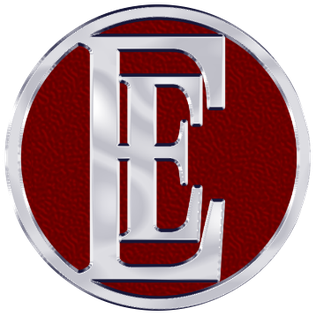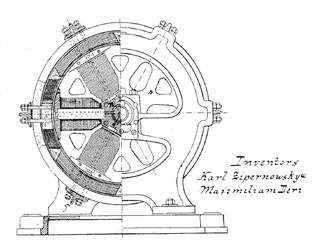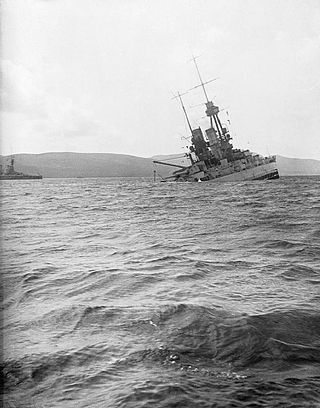Related Research Articles

Thorn Lighting Ltd, a subsidiary of the Zumtobel Group, is a global supplier of both outdoor and indoor luminaires and integrated controls.

The English Electric Company Limited (EE) was a British industrial manufacturer formed after the armistice of World War I by amalgamating five businesses which, during the war, had been making munitions, armaments and aeroplanes.

Rosyth is a town on the Firth of Forth, three miles south of the centre of Dunfermline. According to the census of 2011, the town has a population of 13,440.
Ernest Frank Guelph Cox (1883–1959) was an English engineer, with knowledge in electrical and mechanical engineering, which he notably deployed in marine salvage. Between 1924 and 1931 his Cox & Danks Shipbreaking Co. successfully raised 35 ships of the German Imperial Navy High Seas Fleet that had been scuttled at Gutter Sound, Scapa Flow, in 1919. A tough but caring employer, after a series of fatalities and accidents to his employees, Cox sold his marine salvaging business to the Alloa Shipbreaking Company in 1932. He remained a consultant to the British Admiralty throughout his remaining career, and retired in the early 1950s after selling his profitable scrap metal business to Metal Industries Group.

HMS Edinburgh was a Town-class light cruiser of the Royal Navy, which served during the Second World War. She was one of the last two Town class cruisers, which formed the Edinburgh sub-class. Edinburgh saw a great deal of combat service during the Second World War, especially in the North Sea and the Arctic Sea, where she was sunk by torpedoes in 1942.
Lucas Industries plc was a Birmingham-based British manufacturer of motor industry and aerospace industry components. Once prominent, it was listed on the London Stock Exchange and was formerly a constituent of the FTSE 100 Index. In August 1996, Lucas merged with the American Varity Corporation to form LucasVarity.
Dick, Kerr and Company was a locomotive and tramcar manufacturer based in Kilmarnock, Scotland and Preston, England.

A dynamo is an electrical generator that creates direct current using a commutator. Dynamos were the first electrical generators capable of delivering power for industry, and the foundation upon which many other later electric-power conversion devices were based, including the electric motor, the alternating-current alternator, and the rotary converter.
Exide Industries Ltd, is an Indian multinational storage battery manufacturer company, headquartered in Kolkata. It is the largest manufacturer of automotive and industrial lead-acid batteries in India and fourth largest in the world. It has plants in India and Sri Lanka and dealership network in 46 countries spanning 5 continents. Exide also has four major lead-acid battery recycling facilities — two of which are in the United States, and Spain and Portugal each have one as well. The company claims that 99 percent of lead processed through these facilities is recycled.

The Westinghouse Brake & Signal Company Ltd was a British manufacturer of railroad signs. Founded by George Westinghouse, it was registered as "Westinghouse Brake Company" in 1881. The company reorganised in 1920, associating with Evans O'Donnell, and Saxby and Farmer which merged to form the "Westinghouse Brake & Saxby Signal Company". The 'Saxby' would be dropped from their title in 1935.

SMS Bremse was a Brummer-class minelaying light cruiser of the German Kaiserliche Marine. She was laid down by AG Vulcan Stettin on 27 April 1915 and launched on 11 March 1916 at Stettin, Germany, the second of the two-ship class after her sister, SMS Brummer. She served during the First World War, operating most of the time in company with her sister. The two ships took part in an ambush on a convoy in the North Sea, where they sank two destroyers in a surprise attack, before hunting down and sinking nine merchantmen, after which they returned to port unscathed.

Marmon Group is an American industrial holding company headquartered in Chicago, Illinois; founded by Jay Pritzker and Robert Pritzker in 1953, it has been held by the Berkshire Hathaway group since 2013. It owns companies that produce transportation equipment, electrical components and other industrial components, and companies that provide services in the construction and retail sectors. Tank car manufacturing is a significant part of its business, products which are sold through its subsidiaries Union Tank Car Company in the United States and Procor in Canada. Berkshire Hathaway, which owns the largest freight railroad carrier in North America, BNSF Railway, acquired controlling interest in Marmon in 2007 and became sole owner six years later.

Shortly after the end of the First World War, the German Kaiserliche Marine was scuttled by its sailors while held off the harbor of the British Royal Navy base at Scapa Flow, in the Orkney Islands of Scotland. The High Seas Fleet was interned there under the terms of the Armistice while negotiations took place over the fate of the ships. Fearing that either the UK would seize the ships unilaterally or the German government at the time might reject the Treaty of Versailles and resume the war effort, Admiral Ludwig von Reuter decided to scuttle the fleet.

Megger Group Limited is a British manufacturing company that manufactures electronic test equipment and measuring instruments for electrical power applications.
'The Queen's Award for Enterprise: International Trade (Export) (2009)' was awarded on 21 April.
George Cohen, Sons and Company was a scrap metal merchant with offices in Commercial Road, London. The company was founded by George Henry Cohen (d.1890) as Messrs. George Cohen & Co. in 1834 and changed its name to George Cohen, Sons and Co. in 1883 on the appointment of Michael Cohen, son of the founder. After the First World War the company won a number of large contracts to dispose of surplus munitions including "400,000 tons of high explosives and other shells". The company also engaged in demolition work, with projects including the towers of Crystal Palace, which had survived the great fire, the Dome of Discovery and Skylon at the Festival of Britain, and London's tram system. In 1940 the company moved its head offices to Hammersmith.

SS or RMS The Ramsey was a passenger steamer operated by the Isle of Man Steam Packet Company from 1912 to 1914. She had been built in 1895 as Duke of Lancaster for the joint service to Belfast of the London and North Western Railway and Lancashire and Yorkshire Railway companies. The steamer was requisitioned by the Admiralty in 1914 as the armed boarding vessel HMS Ramsey and sunk the following year.
Hughes Bolckow formerly Messrs, Hughes, Bolckow, and Co., Limited was a well-known shipbreaking company based in Blyth, Northumberland.
SS Bertha was a cargo vessel built for the London and South Western Railway in 1905.
References
- ↑ "Company Meeting", The Times, Sept 13, 1951, p.8
- ↑ "Obituary: Robert Watson McCrone", The Times, Apr 10, 1982, p.10
- ↑ Classified Advertisement, The Times, November 12, 1953, p.2
- ↑ The Times, July 13, 1967, p.19
- ↑ The Times, July 17, 1967, p.17
- ↑ "City panel rejects need for market supervision", The Times, Jan 29, 1975, p.21
- ↑ "Thorn" (advertisement), The Times, Aug 11, 1970, p.18
- ↑ "Metal pair-up by '600' and Thorn", The Times, Apr 14, 1970, p.29
- ↑ "BSC pay £3.75m for one-third interest in scrap processor", The Times, July 31, 1976, p.19
- ↑ Frank C Bowen, "The Shipbreaking Industry", naval-history.net, accessed 2012-04-11
- ↑ "Metal Industries", Grace's Guide, accessed 2012-04-11
- ↑ Buxton 2019, p. 110
- 1 2 "City Notes". The Times . July 29, 1935. p. 18.
- ↑ "City News in Brief", The Times, May 18, 1940, p.10
- ↑ "Company Results", The Times, Dec 12, 1941, p.9
- ↑ "City News in Brief", The Times, Apr 14, 1941, p.7
- ↑ "Company Meetings", The Times, Sept 20, 1946, p.9
- ↑ "Company Meetings", The Times, Aug 31, 1949, p.9
- 1 2 "Company Meetings", The Times, Sept 4, 1952, p.7
- ↑ "Metal Industries expansion", The Times, Jan 21, 1955, p.12
- ↑ "Metal Industries Limited" (advertisement), The Times, Aug 16, 1960, p.13
- ↑ "Business Changes", The Times, Jan 27, 1961
- ↑ Chairman's statement (advertisement), The Times, Aug 2, 1961, p.15
- ↑ "M.I. drive in Europe", The Times, Jan 24, 1964, p.20
- ↑ "Metal Ind. expands in Europe", The Times, July 2, 1965, p.23
- ↑ The Times, Sep 23, 1966, p.19
- ↑ Chairman's statement (advertisement), The Times, Aug 16, 1966, p.13
- ↑ "A year of unprecedented growth" (Thorn advertisement), The Times, Aug 13, 1968, p.17
- ↑ The Times, Aug 18, 1964, p.14
- ↑ "A Salvage Feat", The Times, Sept 3, 1934, p.12
- ↑ Share prospectus, The Times, July 29, 1935, p.19
- ↑ "German dreadnought raised", The Times, May 15, 1936, p.9
- ↑ "Scuttled battleship raised", The Times, May 1, 1937, p.13
- ↑ "Grosser Kurfurst raised", The Times, Apr 27, 1938, p.20
- ↑ "Derfflinger salved at Scapa Flow", The Times, July 25, 1939, p.9
- ↑ Share prospectus, The Times, Apr 9, 1947, p.9
- ↑ "Hope of salving Finnish ship", The Times, Dec 27, 1952, p.2
- 1 2 "Company Meetings", The Times, July 11, 1957, p.17